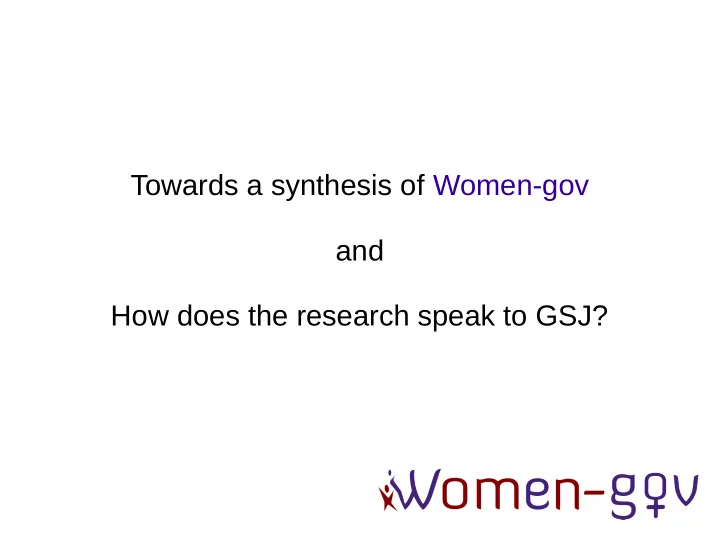

Towards a synthesis of Women-gov and How does the research speak to GSJ?
To test out contextual models in the field of participatory governance, that use digital technologies in a guided manner to deepen local democracy and make local institutions accountable, especially from the standpoint of marginalised women.
To contribute to grounded theory and field building by exploring the conditions under which digital technologies can enable marginalised women to gain active citizenship in terms of informational, communicative and associational power, vis-a-vis local governance processes.
The 'south-south' ● Post colonial contexts – privatization, neo-liberalism and open door policy ● Post-coloniality and discourses of citizenship ('making citizenship familiar' – continuities – democracy in the making, and – discontinuities - women's struggles ● Race, caste, class – – local elite and women's situation as subordinated subjects whose rights and claims are mediated patron-client relationships ● Laws to decentralise governance - local gov institutions are at the vanguard of deepening democracy – climate of active affirmation policies.. – in which women play an important role.
What are the conditions under which digital technologies can enable marginalised women gain active citizenship in local governance ?
Hypothesis 1 - Information structures Guided use creates a new behaviour / culture around information, and enhances the capacity of marginalized women to negotiate (and challenge) existing information hierarchies.
Hypothesis 1 - Synthesis ● Politics and governance – not the same – Techno-sociality and techno-materiality part of local governance and CULTURES ● Neo-liberalism – perverse confluences - more democracy rather than 'deeper' democracy, deeply patriarchal – The rise and rise of the ICT consumer ● The loss of the 'civic-public' – erasures of memory
Hypothesis 1 - Synthesis ● Laws ahead of reality – lack of universal access a big impediment – Brazil versus India ● Digital literacy – multi-dimensional, a new functionality ● Information-entitlements / how does the collective experience of marginality – the politics of exclusion transform?
Hypothesis 1 - Synthesis ● Info centre as a local civic-public institution – New arbiter of public interest ● Subverts the elusive 'everyday state' ● Techno-social system becomes a site for power struggles – symbolic value, caste/ informal leaders, ambivalent negotiations ● Digital functionalities and citizen capabilities – long road
Hypothesis 2 - Local governance relationships Guided use facilitates women’s ability to understand and respond critically to different institutions and power relations, and positively influence their relations with local governance structures
Hypothesis 2 - Synthesis ● Yes, it does, but..... ● Techno-architectures, techno-socialities and governance architectures (whether data is in the public domain) influence 'critical engagement' ● It is a new approach to citizenship pedagogies – going back to “movement building” ● Ever-present patriarchy – and negotiations – church, upper caste elite, mafia
Hypothesis 2 - Synthesis ● Disruptive potential – threshold change in local practices – From vote-back politics to rights-based claims- making ● Essentially a task of participatory institution- building – long long way
Hypothesis 3 - communication and counterpublics Guided use enables women to emerge as an effective counter-public to 'trouble the status quo' and negotiate with (and challenge) patriarchal discourses.
Hypothesis 3 - Synthesis ● At the minimum – in becoming 'familiar' with democracy ● Visible enactments of citizenship to claim public discourse (use a camera) ● The 'feminist' public – custodians of local democracy
Hypothesis 3 - Synthesis ● Do the women speak differently? ● Did representation get democratised? loosen hierarchies and open up leadership?
Hypothesis 4 - solidarities ● Guided use enhances the capacity of marginalised women to visualise and forge gender-based solidarities through local and trans-local networks that transcend social and spatial boundaries.
Hypothesis 4 - Synthesis ● New, liminal (in-between) spaces of civic-public engagement ● From small world networks – strong ties – to new communities (transcending geographic boundaries) – Dialogic, collaborative and collective actions – new practices in local democracy – Do they shift collective identities? Do they generate a feminist constituency? Not sure
Hypothesis 4 - Synthesis ● A new civic-public? (don't know) – Organising around local data – strengthen old associations and build new citizen identities – Beyond ascriptive identities – basis for a new associational life – The legitimacy to speak and be heard, as the state becomes less graspable – Multiple loyalties – that challenge the 'abstract' ideal of citizen
Hypothesis 4 - Synthesis ● How to politicise local democracy? ● What emerging cultural practices can generate flourishing civic-publics?
Policies ● Digital inclusion – public access infrastructure, new capabilities ● Broadband – telecom infrastructure and affordability ● Localisation of data regimes in governance ● Policy implementation and convergence ● Media plurality – overwhelming consolidation and crowding out of alternative voices, regulatory challenges – how far can community media go ● Internet governance – net neutrality ● Donor funding – least cost approaches – 'watering the leaf'
Grounded Theory? What are the conditions under which digital technologies can enable marginalised women become active citizens in local governance ?
Theoretical strands ● Techno-social structures can make citizenship 'familiar' in a way that promotes plural visions of democracy through boundary conversations and new democratic rituals that they make possible ● Contemporary informational and communicative environments (data and media regimes) are mediating 'truths' in a way that displaces embodied and experiential realities.. This seems to be a step back for accountable governance and democracy, and for women's rights struggles.
Theoretical contribution to Governance, Security and Justice ● Governance, security (human, livelihood) and justice – framed by regimes of techno-socialities ● There is a theoretical possibility to address structures of exclusion, but they are theoretical without – Governance of digital technologies – Citizen-focussed (techno) architectures of public administration – Community-based institution building for participatory democracy to deepen democracy and tackle gender based exclusion
Recommend
More recommend